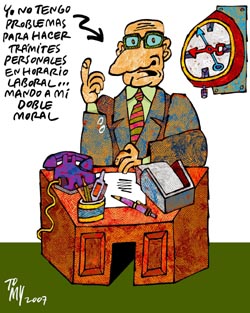
May 31, 2007
Labor and Administrative Discipline:
Bureaucracy Called on the Carpet
By:Maria Julia Mayoral
ma.julia@granma.cip.cu

A CubaNews translation by Greg McDonald.
Edited by Walter Lippmann. Original:
http://www.granma.cubaweb.cu/2007/05/31/nacional/artic02.html
The Cuban government, backed by the vast majority of workers, has impelled the strengthening of labor and administrative discipline here. This signifies a clarion call to the well-entrenched bureaucracy, and to the administrative and legalistic demands it places on the population.
According to a report released by the Ministry of Labor and Social Security (MTSS) -- the leading institution to promote this process --, there is now a move to stagger, extend or advance office hours for the provision of administrative services. New workdays have been created during alternate Saturdays or half-days on each Saturday to offer these services, including Sunday mornings in the case of specialized administrative processes.
With regard to the official bureaucracy, the most common change involves an extension of office hours until 7 or 8 pm during one or more days of the week to provide easier access for the workers.
In a hearing conducted by the Economic Affairs Commission of the National Assembly of People's Power, Alfredo Morales Cartaya, minister of the MTSS, said that although organizational reform in favor of labor discipline has begun, it is not yet possible to show spectacular results in such a short time.
Because of insufficient notification by our state entities, many people are still unaware that they no longer need their working hours to handle their affairs in stores, repair shops, document-processing offices, banks... which are now open during hours that do not interfere with the workday.
Others, in spite of being in the know, persist in the bad habit of taking advantage of their work time to "leave for the street to make necessary arrangements", on occasion with the knowledge and approval of their immediate superiors, who, it seems, do not yet understand the importance of restoring discipline, efficiency, increased output...
People give different reasons to justify erratic work habits, ranging from difficulties with the transit system to the obligation to file some paperwork, within a pressing schedule and their need to use the early hours of the day to find better deals in shops, markets, and hard currency stores.
Readjusting office hours can help eliminate excuses for indiscipline and help quickly to curb bureaucratic excess and its negative effects, at least in the case of the above processes.
For many years, now a national organization led by Parliamentary Vice-President Jaime Crombet, has studied bureaucratic performance to make it as flexible and efficient as possible, via requests and specific recommendations to the responsible institutions, but up to the present results have been minimal.
This group has, however, managed to help remedy the situation. As a control measure, the Council of Ministers has forbidden the creation of new bureaucratic procedures without previous evaluation and approval by the Council.
As is clearly seen, conflict has been anything but overlooked. The population, however, remains for the most part unsatisfied. Time wasted, excessive paperwork, the distant location of offices -- especially in the rural sector --, lack of attention, mistreatment, lack of appropriate information for the clients... fill the extensive list of citizens' complaints.
The need to fulfill bureaucratic requirements does not justify being away from work, but if bureaucracy and the ineffectiveness attached to it it continue to set the pace, many people, rightly or otherwise will try to hide behind institutional weakness. The current call to order and discipline, is, without a doubt, a summons to bureaucracy and bureaucrats.
EDITOR'S NOTE: The cartoon character is saying: I don't have any problem taking care of personal business during working hours. I just send my "doble moral", a kind of play on the expression "send my double", but here "doble moral" doesn't mean someone who looks like you, but instead means "double standard".
|
|
|
|
|
[http://www.granma.cubaweb.cu/2007/05/31/base.htm]
|
|
http://www.granma.cubaweb.cu/2007/05/31/nacional/artic02.html